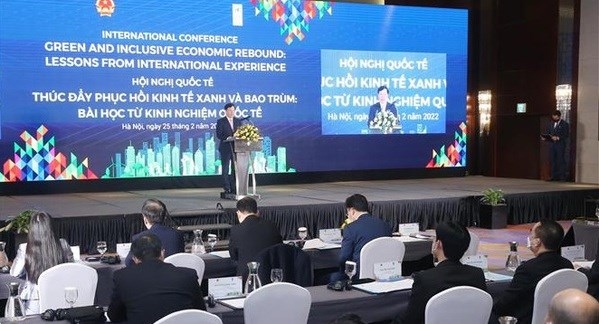As one of the countries heavily affected by the COVID-19 pandemic, Vietnam is determined to pursue green and inclusive recovery, Deputy Prime Minister Pham Binh Minh said at the International Conference “Green and Inclusive Economic Rebound: Lessons from International Experience” in Hanoi on February 25.

At the International Conference “Green and Inclusive Economic Rebound: Lessons from International Experience” in Hanoi on February 25 (Photo: VNA)
According to the Deputy PM, Vietnam has issued a programme on socio-economic recovery and development to further support businesses and people, and speed up socio-economic recovery.
The programme sets out major solutions such as economic reopening in combination with investment in health care, ensuring social welfare, support to enterprises, cooperatives and household businesses in recovery, infrastructure development and administrative reform.
Along with the programme, the country has updated and rolled out many socio-economic development strategies, programmes and plans, notably the 2021-2030 socio-economic development strategy and another on green growth for the period.
The Vietnamese government has also actively implemented major orientations on green, circular economy, while making efforts to fulfill its commitments to climate change response, especially the target of net-zero emissions by 2050 presented by Prime Minister Pham Minh Chinh at the 26th United Nations Climate Change Conference of the Parties (COP26) last year.
He underlined that serious threats from non-traditional security challenges require countries to re-evaluate, develop and implement policies and measures to innovate growth models, promote green and circular economies, strengthen international economic cooperation and linkage, digital transformation for a more inclusive and sustainable recovery.
“The biggest question to the Vietnamese Government after the COVID-19 pandemic lies with not only recovery but how to recover,” Deputy PM Minh said.
With the strong commitments at the COP26, the answer for the Vietnamese Government is quite clear that is green and inclusive recovery, he stressed.
He noted that it will be a profound transition process that requires Vietnam to focus on consolidating institutions and policies, adjusting economic structures as well as relevant national targets and strategies towards green, low-carbon growth and resilience to adverse impacts of climate change and external shocks.
Highlighting difficulties and challenges faced by Vietnam in the transition process, the Deputy PM wished leaders and experts at home and abroad would share experience in green and inclusive recovery, propose overall solutions suitable to Vietnam's circumstances, conditions and priorities, thereby supporting the country to effectively implement the socio-economic development and recovery programme, the 2030 Agenda for Sustainable Development, the Paris Agreement on Climate Change and Vietnam’s commitments at COP26.
For his part, Deputy Foreign Minister Pham Quang Hieu held that the present economy recovery would offer an opportunity for Vietnam to shift towards green, circular economy in line with major orientations set at the 13th National Party Congress.
The foreign ministry will work as an advisor for the Government to keep updated on the world’s major trends of digital transformation and green development, he said, adding that the ministry has also closely coordinated with other ministries, agencies and localities to mobilise financial and technological support from partners to help Vietnam improve its climate change adaptation capacity, and reduce greenhouse gas emissions.
In his remarks, UNDP Administrator Achim Steiner commended Vietnam for impressive achievements in poverty reduction, human development, and universal adult vaccination.
He said Vietnam’s commitments made at the COP26 mirror Vietnam’s resolve to implement climate change measures.
Steine affirmed that a green and inclusive rebound is possible if efforts are made to transcend the logic of trade-offs of economy versus environment and focus instead on the synergies from economic development that prioritises sustainability and inclusivity.
He highlighted six lessons from UNDP’s global efforts to support countries in driving a green circular economic rebound, including innovative long-term financing; just climate transition; bridging the digital divide; gender equality; triple-a governance (anticipatory, agile, and adaptive); and shock-resilient social protection.
Speaking at the conference, Professor Joseph E. Stiglitz, the Nobel Memorial Prize economist, suggested Vietnam maintain the green growth pace towards sustainability and inclusiveness, with attention paid to dealing with inequality.
With its political stability, Vietnam should attract different capital sources, including the private sector, he said.
The conference was co-hosted by the Vietnamese Government and the UN Development Programme. It brought together about 500 delegates, including foreign leaders, representatives from international organisations, and prestigious experts and scholars at home and abroad.
The conference is timely as Vietnam stands at a critical juncture as it seeks to rebound from COVID-19 in ways that generate growth, are job-rich, sustainable, and inclusive. It provided a platform for policy makers and other stakeholders to share visions, knowledge and best practices relating to green economic stimulus, COVID-19 economic recovery, climate action, circular economy, anticipatory and inclusive governance and green finance and investment.